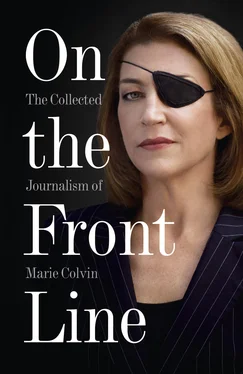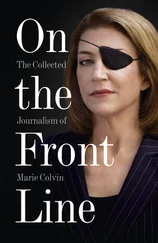The feeling of relaxation can be deceptive. A group of West Germans had to be rescued by their ambassador a few weeks ago after a local revolutionary committee broke up their late-night party. Three other foreigners sentenced to 90 lashes for having affairs with local women had to be spirited out of the country.
But among Iranians, even former royalists have come round to Rafsanjani as the alternative to radical clerics and renewed revolutionary turmoil. ‘He’s a mullah but he’s the only hope for Iran,’ said a wealthy doctor.
Having squared the rich, Rafsanjani faces a new and much more serious threat. Tehran’s poor southern suburbs, home to the ‘oppressed’ in whose name Ayatollah Khomeini proclaimed revolution in 1979, are seething.
Wages are low, prices mount daily, and housing is hard to find. Hopes raised by Rafsanjani’s election in August are fading fast. The discontent is dangerous. The poor feel they have as much claim to the revolution as the mullahs. Their street protests drove out the shah, and they could do it again.
Anger is openly expressed. Ismail, 34, a shoemaker in the Shahpur bazaar in southern Tehran, was one of Khomeini’s foot soldiers.
‘Everyone around here went out in the streets,’ he recalls. ‘Even the six-year-olds. They promised us everything. They said it was Allah’s land and we would get some of it.’
Ten years later, Ismail pays 40,000 of his 60,000-rial monthly wage (£37) to rent one ground-floor room in which he, his wife and three children eat, sleep and receive visitors. The home is meticulously clean but shabby and cramped.
The family’s energy goes into finding food. Subsidies should make staples such as sugar, rice and cooking oil cheap. But Ismail’s wife cannot remember the last time the government distributed rice in their neighbourhood.
A black market mafia controls food distribution and locals say government officials take bribes. Corruption goes beyond the bazaar. A surgeon said middle-men received state money for drugs but provided cheaper, often toxic, substitutes and pocketed the difference.
Despite the privations, Rafsanjani still enjoys tremendous goodwill among the poor as well as the rich. But Iran’s future will be determined by whether he can overcome radicals in the regime who oppose both his desire to open Iran to the West and to give more freedom to private businessmen at home.
To secure his position he has been quietly dismantling revolutionary committees, set up to enforce Khomeini’s line, and sending their members back to their own jobs.
He also seems to get support from an unexpected source. Khomeini’s daughter, Fatima, said last week she was considering running for parliament in elections due in December. She is intelligent and more astute than her ambitious brother, Ahmed.
She said Rafsanjani’s policies ‘followed the Imam’s mind‘, and she can cite Khomeini’s name with more authority than any radical.
Rumours abound of struggles in the leadership. The strangest concerns a mysterious shipment of gold allegedly linked to radicals trying to finance their own projects.
One night earlier this month national television showed film of two lorries loaded with 10 tonnes of gold ingots, worth $120 million, allegedly captured near the border with Pakistan. Three days later the government announced the bars were in base metal painted gold. Nevertheless the entire smuggled shipment went to the central bank. Ominous graffiti reads: Khar Khodefi ‘You can’t fool us here’.
The unsettled climate comes at a time when Rafsanjani is trying to find an accommodation with the United States so that he can convince foreign investors their money will be secure in Iran. But the situation is stalemated. President George Bush wants Rafsanjani to show good faith by securing the release of hostages in Lebanon. Rafsanjani told western correspondents last week that Iran needed a western gesture of good faith first.
There is so little contact between them that a friendly embassy sends facsimiles of the Tehran Times’s leaders to Washington every day because Americans for a while believed the regime was planting messages for the administration in the newspaper’s editorial page.

Soviet settlers jolted by the promised land
ARIEL, WEST BANK
11 February 1990
Dmitri Rafalovsky had just arrived off a flight from the flatlands of the Ukraine. Now he stood in Ariel, a small town in the occupied West Bank of Israel, and stared at the starkly beautiful view.
In the distance he could see picturesque villages with stone houses wedged among unfamiliar hills. Everything looked peaceful in the promised land.
But what he and his wife, Elizabeth, did not know when they arrived here last week was that they had abandoned the Soviet Union with its anti-Semitism and threat of pogroms for a land where the villages they were now looking at housed Palestinian Arabs in revolt against their Israeli masters.
The shock was considerable. ‘What do you mean, this is the West Bank? Oh my God, don’t tell my wife!’ he said. Rafalovsky, 55, knew only too well the dangers; Soviet television had been full of the violence for over a year, although all seemed quiet now. ‘It doesn’t look that dangerous,’ he muttered, doubtfully.
The Rafalovskys are a tiny part of a mass emigration of Jews from the Soviet Union which is changing the demographic map of Israel. Fearful of the changes at home, and witnessing growing signs of hostility and violence, they are flooding into Israel.
The surge has been relentless. Last year 13,000 entered; in January this year 4,500 arrived; in the first week of February no fewer than 1,300 came in.
Because there are no direct flights from the Soviet Union, charter planes are arriving almost daily from East European capitals carrying the latest victims of the diaspora.
The numbers coming in are now so great that the predictions last year of 100,000 look inadequate. Some observers expect between 500,000 and 1m will enter Israel over the next few years, changing for ever a country of just 4m inhabitants.
Rafalovsky, like many of the Soviet Jews who disembarked last week, has only a vague notion of Israel. All he knew was that he wanted to leave the Soviet Union and, with the door to the United States closed, an Israeli visa was the only quick way out.
He was still vague about how he had arrived in Ariel. ‘We were at Ben Gurion airport in the reception office, and the man from Ariel told me it was a small town in the mountains with not many people. He showed me on the map and said, “See, it is in the middle of Israel.” I said it sounded like the place for me.’
It was only dawning on him now that he had arrived in the midst of a controversy equal to anything in the Soviet Union.
Soviet Jews are meant to be able to settle where they like, and there are clear Israeli government denials that they are being encouraged into the occupied territories.
Everyone knows, especially the United States, Israel’s most generous benefactor, that immigration into these lands could jeopardise the already delicate Middle East peace process.
Despite the risks, it became evident last week that the government is concealing how many Soviet Jews are settling there. Figures released on Friday said only 63 had settled in the West Bank. In Ariel alone, however, an estimated 150 people have arrived in the past four months.
It has been a difficult choice for the Rafalovskys. Despite the intifada, they saw advantages in their new West Bank home. Their two-bedroom house is larger than their Kiev apartment, and they have brought their 17-year-old son, Vadim, and Elizabeth’s elderly mother.
Читать дальше













